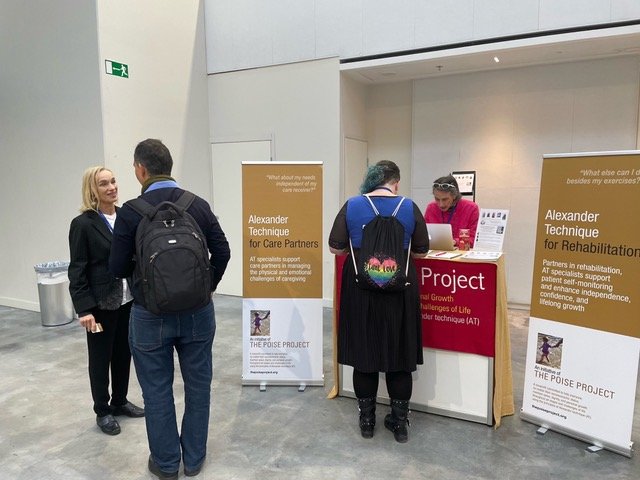How Alexander Technique lessons can help family carers - Part II
The ASO Newsletter - 40th Edition
Enabling greater understanding of the Alexander Technique together
Introduction
This month, Erica Donnison conducts part II of her interview with Monika Gross from The Poise Project , discussing how Alexander Technique lessons can assist caregivers for individuals living with Parkinson’s, Dementia, and other medical conditions, based on new research conducted in collaboration with colleagues from the University of Idaho. The research was designed around in-person and online Alexander Technique courses that The Poise Project (TPP) had received funding for. Questionnaires were administered after the courses and then at 6 months and 12 months post course.
In the second part of this two-part series, Monika elaborates on communicating Alexander research to researchers and other healthcare and related professionals, and she discusses future plans for The Poise Project. To provide further details on the research discussed, a copy of an oral presentation delivered at the 2023 European Alzheimer’s Conference can be found below.
Part II: On Communicating Alexander Technique Research, and Future Plans
Presentation - Partnering with Poise: Retention of benefits 12 months after Alexander technique online group course for care partners of people living with dementia
Monika Gross presents The Poise Project research at the European Alzheimer’s Conference on October 17, 2023. This PowerPoint presentation was part of a panel of four oral presentations titled "Informal carer support and training" at the 33rd Alzheimer Europe Conference in Helsinki Finland. The presentation was attended by over 70 delegates, including care partners of people living with dementia, clinicians, and researchers from across Europe and beyond.
Interview Downloads and Links:
Download The Dyadic Research Abstract and Poster: Importance of informal care partner participation in interventions for people living with Parkinson’s disease
A link back to the discussion on ASO in September 2023 where Monika talks about the conferences and symposia that she attends to disseminate the Poise Project work.
Download The Poise Project 2023 AT Research Handout. An up-to-date handout with peer-reviewed research citations.
Additional Links
Descriptions of all the conferences The Poise Project has attended with a team and/or with research to present, since 2016. https://www.thepoiseproject.org/our-advocacy
Background on the “Poised for Parkinson’s” course and other work with people living with PD and their care partners. https://www.thepoiseproject.org/alexander-technique-for-parkinsons
Link to all TPP’s research presentations since 2016. Research on Parkinson’s comes first; research on Care Partners is lower down on the page. https://www.thepoiseproject.org/tpp-research
TPP Donations page: https://www.thepoiseproject.org/donations
About
Monika Gross is an internationally certified Alexander technique specialist with 40 years of experience. She holds a BFA in Drama from UNC School of the Arts, and is a teaching member of the American Society of Teachers of the Alexander Technique, and Alexander Technique International. She is a Master Somatic Movement Educator and Therapist through the International Somatic Movement Education and Therapy Association, and is an active member of the American Congress for Rehabilitation Medicine. She lives in Asheville NC. Since 2016, Monika has served as Executive Director of The Poise Project.
The Poise Project is a US nonprofit with the mission to serve the public in maintaining poise, dignity, and personal growth throughout all stages and challenges of life by using the principles of Alexander technique (AT). We are committed to removing barriers and making AT education available across broad socioeconomic groups, to those with chronic conditions and their family care partners, and to children and youth, so that everyone will have the opportunity to be introduced to the AT principles by the age of 21. We design and deliver AT-based courses for target populations, initiate research projects on the efficacy of AT principle-based approaches, and provide continuing education to industry professionals.
Thank You
Special thanks to Monika Gross and The Poise Project for the generous contribution to this post. To our community members, your engagement and contributions are making a difference. To support ASO you can subscribe here for free, share this post, leave a comment below, or send us an email; your voice matters!



